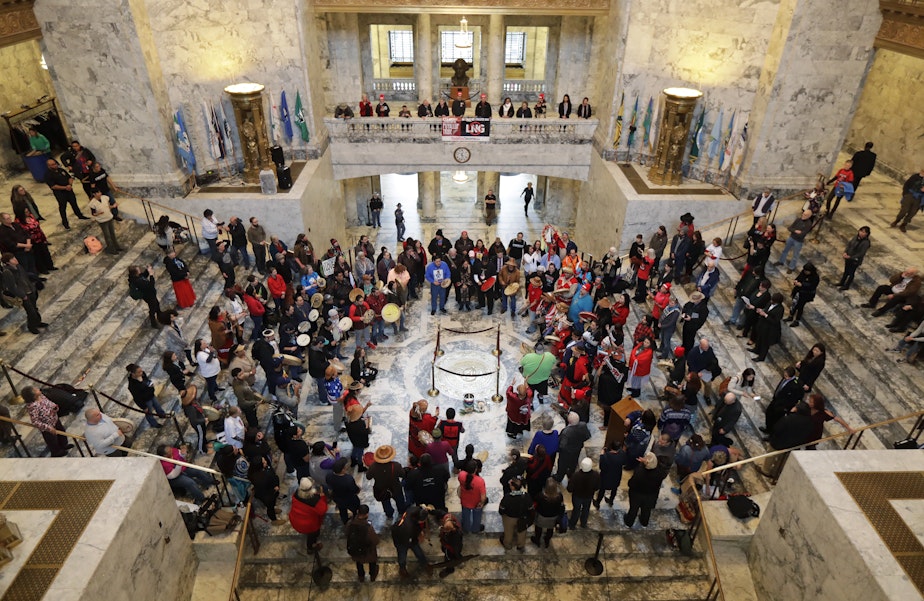This is why Native American voters in Washington state rallied behind Joe Biden

A national spotlight has been cast on the Native American vote for its role in flipping key battleground states from red to blue in the 2020 presidential election.
While Washington state predictably voted for the Democratic ticket, Native voters say a Biden presidency could be particularly favorable for Indian Country.
D
avid Bean, a tribal councilmember of the Puyallup Tribe, wasn’t surprised to see an outpouring of support for President-Elect Joe Biden among the nation's membership.
“The [Trump] administration really took steps back with respect to engagement with Indian Country,” Bean said. “They had a commitment to restoring tribal land. To unpack this, you have to look at the years of the diminishment of tribal lands, and tribal authority at the hands of the federal government.”
But Biden has committed to returning tribal lands, which the federal government began to seize during the mid-twentieth century, amid an effort to terminate Indian nations and compel their assimilation. He's also pledged to enact policy to strengthen tribal sovereignty, and honor the federal trust and treaty obligations that the U.S. government has to tribal nations.
Bean said that many Puyallup tribal members who cast their ballots this year had done so for the very first time in their lives.
In Washington state at large, 58% of voters backed Biden. That support was even stronger among people living on tribal reservations, according to voter precinct data. Those residents backed Biden at 65%.
Of residents living on the Puyallup reservation, 61% voted for Biden, according to precinct data from Election Night. For President Trump, 39%.
In other parts of Washington, the voting contrast between reservations and surrounding counties was even more stark.
People living on the Lummi, Quinault, Skokomish and Port Gamble S’Klallam Tribal reservations gave Biden more than 70 or 80% of their vote — and that was far more votes for the Democratic ticket than their surrounding counties did.
Nationwide, the Native American vote has been in the spotlight for its role in flipping the key battleground states of Arizona and Wisconsin from red to blue.
Rion Ramirez, who chairs the Democratic National Convention’s Native American Caucus, called the Biden campaign's engagement with Indian Country a historically unprecedented effort.
“They actually went down to a very, very micro level of targeting some of our tribal communities within the country in a way that other people hadn’t in the past,” Ramirez said, adding that the campaign focused on advertisements in tribal newspapers and media.
“President-elect Biden and Vice President-elect [Kamala] Harris did a really good job of engaging Indian Country through establishing different policy groups associated with Indian Country,” he said. “And ultimately, what came out of that was an incredibly progressive platform for Indian Country talking about the things and the issues that matter most to us.”
For the Puyallup Tribe, which is surrounded by the Tacoma metropolitan area, the foremost political issue is that of tribal sovereignty, Bean said.
"When the Biden-Harris campaign team came out with their native American policy, it was pretty easy to see that they clearly understood, respected, and supported tribal sovereignty,” he said. “That's the lens through which we look at when we make decisions and recommendations to our community members.”
Biden has also pledged to address health disparities — including disproportionately high rates of Covid-19 — that are impacting Native American communities.
Additionally, the president-elect has said he will work with tribal leaders to stop the epidemic of violence against Indigenous women. For Abriel Johnny, that was a big part of her decision to vote for Biden.
"One of the reasons I was voting was to bring accountability to missing and murdered Indigenous women," said Johnny, who was raised in Seattle but is of the Cowichan and Tlingit nations in British Columbia.
She chairs the Seattle-based nonprofit United Indians of All Tribes Foundation and is the tribal engagement manager of another non-profit, HealthierHere. As part of that work, Johnny participated in the local #VoteAsYouAre campaign this year, spearheaded by former Washington House of Representatives candidate Sharlett Mena.
"The campaign centers voters who generally feel invisible by their government," she said. "It feels like the tactic of erasure is often used on our [Native American] community, which includes our voice. We're often erased in data, we are often erased from public view.
"And so part of my attempt to support Native American voter registration and Native American votes, was to educate and share my own personal experience and views on why our community should be voting," Johnny added.
Johnny has a message for politicians: Don't underestimate the collective power of historically underrepresented communities to turn the tide in elections.
"This increase in votership of all of the Black, Indigenous and people of color communities feels like it was a collective effort to stand in solidarity, to be able to heal together, and to seek justice together," she said.


